
My lesson from July is that reading more books does not always equal more great reads. I read fourteen books this month, but only a few were standouts. That’s just the way it goes sometimes. Luckily, I finally started watching Ted Lasso. (Hello, Roy Kent!) Between that and the Olympics, I’ve had plenty of non-book-related content to keep me busy. I appreciated these few gems as well.
As always, in these reviews, excerpted quotes are transcribed from audio, which is my primary reading method these days, so I apologize for any discrepancies in punctuation.
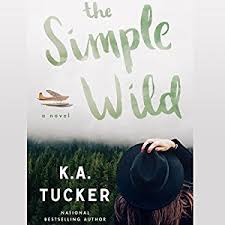
One of my July books was a re-read of K.A. Tucker’s The Simple Wild, which I loved last year. It’s about a city girl and fashion blogger who grew up in Toronto and has been estranged from her father, an Alaskan bush pilot. When Calla learns her father has lung cancer and time is running out to get to know him, she flies out to stay with him, where she’s a classic fish out of water. There, she also butts heads with one of her father’s pilots, Jonah. It’s a romance, so of course their combativeness yields to attraction and feelings.
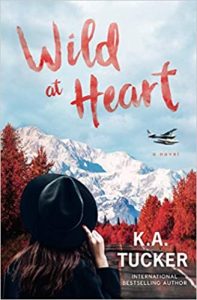
I still enjoyed this book on my re-read, but the book I want to gush about is the second in the series, a true sequel where we stick with Calla and Jonah as they try to make their relationship work, called Wild at Heart. As such, there are some unavoidable spoilers for book one here.
So, if book one is Calla falling in love with both Alaska and Jonah, book two is when the figurative honeymoon phase wears off. Jonah compromises to get Calla back to Alaska, agreeing to relocate from the rural interior closer to Anchorage so she’ll be near a city and its amenities. Their plan is to start up a new charter service together with Jonah flying and Calla managing the business.
But pretty quickly, Jonah pushes for a cabin quite a bit outside of Anchorage because it has an already established air strip – he could fly straight out of their property instead of from a public airport. He also struggles to stick to his flight plans, sometimes taking detours, coming home later than he promised and worrying Calla. He’s already crashed a plane in front of her, and she fears it happening again.
Meanwhile, Calla’s lack of a driver’s license and the general threats of the outdoors leave Calla stuck at home a lot. She winds up waiting around for Jonah to come home and resenting that her exact worry of being abandoned in the middle of nowhere, just like her mother had been years ago, seems be coming true. With her world shrunk down to their outdated cabin, she starts buying things to fix it up and create an Instagram-worthy home. Though she has quite a bit of money from her father’s will, they fight over her excessive spending. Jonah accurately reads it as a symptom of her misery there, a way to make the surface prettier when the deeper issues remain: her isolation, her lack of a purpose in Alaska, and all the challenging elements of the environment. These elements include an unwanted goat left on the property, bears, a crotchety neighbor and his scary wolfdogs, enormous mosquitoes, the waning sunlight, and a pushy local named Muriel who forces to Calla get her garden started (even though Calla never intended to start one), join a running club, and volunteer with the winter carnival.
Calla laments to Jonah, “I’m trapped in a log cabin in the woods with a goat and a raccoon and no driver’s license. A crazy woman with a gun just told me I’m making strawberry jam and growing cabbage this year. Frivolous spending is all the joy I have.”
This book reads a lot like a second chance romance even though Calla and Jonah are still in the beginning of their relationship. They’re not even engaged when they buy their cabin and start their business together. But they work through some pretty big issues, many of which have been there since the first book. When Jonah initially asks her to come back to Alaska to be with him, she asks what they’ll do if she can’t be happy there, knowing that being an Alaskan bush pilot is essential to his identity. He tells her he doesn’t want Alaska without her.
It’s a beautiful line, but what we see in the bulk of book two is that the weight of their decision to be together really falls disproportionately on Calla’s shoulders. She’s the one who has to adjust the most, and she’s the one who lacks a purpose beyond their relationship, though she’s competent at running their business. Jonah’s main sacrifice is that he turns down bigger jobs he’d love to take because he knows Calla can’t handle him leaving for extended periods.
This is a single-POV book, so we are really immersed in Calla’s experience. K.A. Tucker smartly gives us a lot of time with Calla and Jonah, including some much-needed playful and swoony moments, while also delving deeply into Calla’s personal journey outside of Jonah. The relationship, it becomes clear, cannot be all Calla has to cling to. This is where Muriel’s pushy presence is vital. The ways she pulls Calla out of the safety/confines of the cabin help her to make more meaningful connections to the place and community. Calla resists the garden in the beginning, but when her labor produces actual food, she feels proud. And her volunteer work with the winter carnival gives her a chance to contribute and shine at something she’s truly good at.
Oddly, I love how unromantic parts of this book are. Not only do we see the couple struggle to make their relationship work, but even the landscape and community could easily have been romanticized but aren’t. In the first book, Calla comes to appreciate the beauty of Alaska and the resilience of the people living there, which helps her see her own privilege and expectations for convenience and comfort, to distill what really matters. Honestly, I picked up The Simple Wild in the first place because I have my own romantic notions of Alaska and sense that living somewhere so beautiful would make my life somehow more beautiful. But Wild at Heart puts that fantasy to rest for me. Which sounds like a complaint, but it’s not. As a person who often wonders how much easier life would be somewhere else (like right now, at the peak of summer in Houston), I really feel for Calla. I like that she must see both the environment and the person before her for exactly what they are and decide to love them anyway.
Speaking of unromantic, there is also a brilliant, botched proposal scene in this book that’s as satisfying as any successful one.
Ultimately, this book threads the needle of pushing a character to grow and maintaining her core self. It doesn’t twist the ways she’s mismatched with her environment into blatant flaws or judgments of her. Calla still loves beautiful things, still wants expensive raw-edge wood tables and fancy chandeliers and to share them via Instagram. Her social media and PR skills are valuable in both her and Jonah’s business and the charity work she does with Muriel.
Early after her return to Alaska, she complains to Jonah about having “to walk through ten feet of snow, in the dark, probably with wolves and shit around, and freeze my bare ass every time I need to pee.” Instead of telling her she’s overreacting or taking her complaints too seriously, he says, with affection, “God, I missed your bad attitude.” As a person who often has a bad attitude about things, I adored this moment. Because just as Calla has to accept Jonah and Alaska for what they are, Jonah also has to do the same for her.
This second book shows what happens after the couple decides to make a go of things, the hard part where they have to really work for their relationship. I found it really moving and grounded. If you love these first two books, don’t miss out on the follow-up novella, Forever Wild.
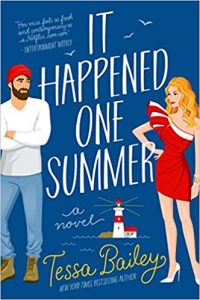
Next up is Tessa Bailey’s July release, It Happened One Summer. If you like Alexis Rose from Schitt’s Creek, you’ll probably have a soft spot for Piper, a rich girl Hollywood socialite whose misguided public antics land her exiled for three months by her step-father to a coastal town in the Pacific Northwest to learn a lesson. The place is full of fishermen, including grumpy local captain, Brendan. Piper’s biological father was also a fisherman and died in this town, leaving a bar behind, which she and her sister (along for moral support) move into and decide to refurbish with hopes of demonstrating that Piper isn’t as entitled and frivolous as her step-father thinks and, hopefully, shortening her punishment.
Brendan, steady and loyal and skeptical of outsiders, initially judges Piper for her ridiculous outfits and her complete lack of basic life skills, but he soon sees her big heart, her resilience, and her willingness to work hard, even when everyone doubts her. Not only are Brendan and Piper opposites – she’s the life of a party, well-liked everywhere she goes, and spontaneous while he’s grumpy, clings to routines, and resists trying new things – but there’s also the fact that his job is so dangerous. Even if Piper’s life weren’t back in Los Angeles, she’s not sure she has what it takes to be a captain’s partner if they pursue things long-term.
I love the communication in this book. While there is a significant plot point that hinges upon a lack of cell service, the rest of the time, Brendan reads Piper so well that he can tell when she clams up and presents the mask she’s used to showing the world instead of being real with him. He wants meaningful intimacy with her, not casual sex. And when it’s clear that they need to have an honest conversation about their relationship, he gets her out on his boat where she can’t run from it.
One of my favorite lines in the whole book is a quiet moment when they could argue and Piper says instead, “You’re actually really thoughtful and wonderful, and I don’t want to argue with you.” Simple, mature, and lovely.
While Brendan fits the bill of a typical Tessa Bailey alpha hero in some ways, he is also quietly dependable, observant, loyal, and motivated by duty to others – sometimes to his own detriment. He fixes little things without being asked. And he’s absolutely enamored with Piper’s sparkling presence. She hasn’t been truly seen or appreciated by anyone else before this, except maybe by her sister, but Brendan appreciates the immense force of her heart and wants to protect her from the judgment and dismissal and rejection she’s used to.
There’s a great scene when Piper encourages Brendan to try a different meal than his usual – the pot pie, perhaps. He explains, “I don’t try things. If I make the decision to eat the pie, I’ll have to eat the whole thing. I don’t just go around sampling shit and moving on.”
I won’t spoil the pot pie story thread, but just know that it comes back later, and it’s adorable. This book is heartwarming and tender. It also packs some steam. I would expect nothing different from Tessa Bailey.
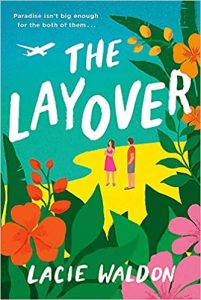
My final great read of July is billed as The Hating Game meets The Unhoneymooners, which, fun fact, is also exactly the comp titles used in promos for Angie Hockman’s Shipped. In both cases, I think those titles are exactly right, so if you loved them, you’ll probably really enjoy this debut by Lacie Waldon, The Layover.
The hook here is enemies to lovers, but they’re flight attendants! Lacie Waldon is a flight attendant herself, which I didn’t know before I read it but which doesn’t surprise me at all. The details in this book really sell the world and the lives of the characters, from Ava’s specific routines around packing to their duties aboard the plane and the kinds of people they interact with.
Ava is a lifelong wanderer, raised by wanderer parents, who has always felt that she should settle down and choose stability over adventure. She’s newly engaged and decides to quit flying, finally lay down her roots. She embarks on her final trip, which includes a rare, full 24-hour layover in Belize. It would be the perfect sendoff if not for Jack, former pilot turned flight attendant and Ava’s nemesis, though she doesn’t actually know him very well. Usually a polite and warm person, Ava finds herself accessing surprising hostility around Jack, but close proximity on the plane starts to chip away at her dislike of him. Being in the air also forces Ava to confront the fact that she loves flying and maybe isn’t ready to quit. By the time they reach Belize, she has a lot to consider on both fronts, and it’s all exacerbated when their layover gets extended by an issue with their plane.
First of all, if you’re having pandemic fatigue and want to travel somewhere vicariously through characters, this is a terrific book for that. Not only might you enjoy the more mundane delights of airports and flying in a world without masks, a kind of old, familiar normal, but you can also escape into the beauty of Belize with dance lessons on the beach, night swimming in the ocean, snorkeling, and lounging poolside. I wanted to be in just about every scene of this book.
But the real heart of The Layover for me is really Ava’s central question of whether to do the typical, “responsible,” “grown up” thing and settle down somewhere or keep adventuring and own that wanderer’s spirit even though, at times, it has cost Ava relationships, made her nervous and unmoored, and been misunderstood by others. As a child, because of her parents’ traveling, Ava missed important school tests and sleepovers with friends, which had a detrimental effect on both her grades and her relationships. As an adult, she still struggles with maintaining friendships when being on call and missing events makes her appear flaky and undependable. She insists at the start of the book, “Life on the road was what I grew up with, my parents’ ideal. My dream has always been to stay still.”
But the certainty of this declaration gets eroded as we see Ava in the air, doing her job, marveling at the view of the blue sky around her. We start to understand that her sense of self worth and the kind of stable life she hopes will be fulfilling have been shaped by others’ opinions – people who are not wanderers themselves and don’t see the value in it, only flightiness and broken plans.
As she gets to know Jack better, she discovers a likeness in him that she doesn’t share with her fiancé or her friends back home. “I think I saw it in him that first night at the bar. I took one look at his crooked smile and that dark hair, windswept like he’d been driving with the windows down, and I recognized him as one of us. The wanderers. The people I’ve tried so hard not to be like even though I can feel the fibers of them woven into my skin, my restless feet leading me our of my room on overnights, out into the world.” This recognition of herself in Jack is central to both their developing relationship and her own self-acceptance.
The relationship, too, is really lovely, Jack grounding so many of their scenes with his easy charm, unflappable nature, and disarming honesty. Though he finds Ava’s hostility toward him amusing, at a certain point, he tells her, “I don’t want to play this game anymore. I want to be allowed to like you, and I want you to like me,” and it’s refreshingly straightforward and sweet.
This book was a total delight for me. It made me feel all the giddy, swoony feelings I want from a romance, and it’s a perfect summer escape.
I wish you an armload of great books in August!

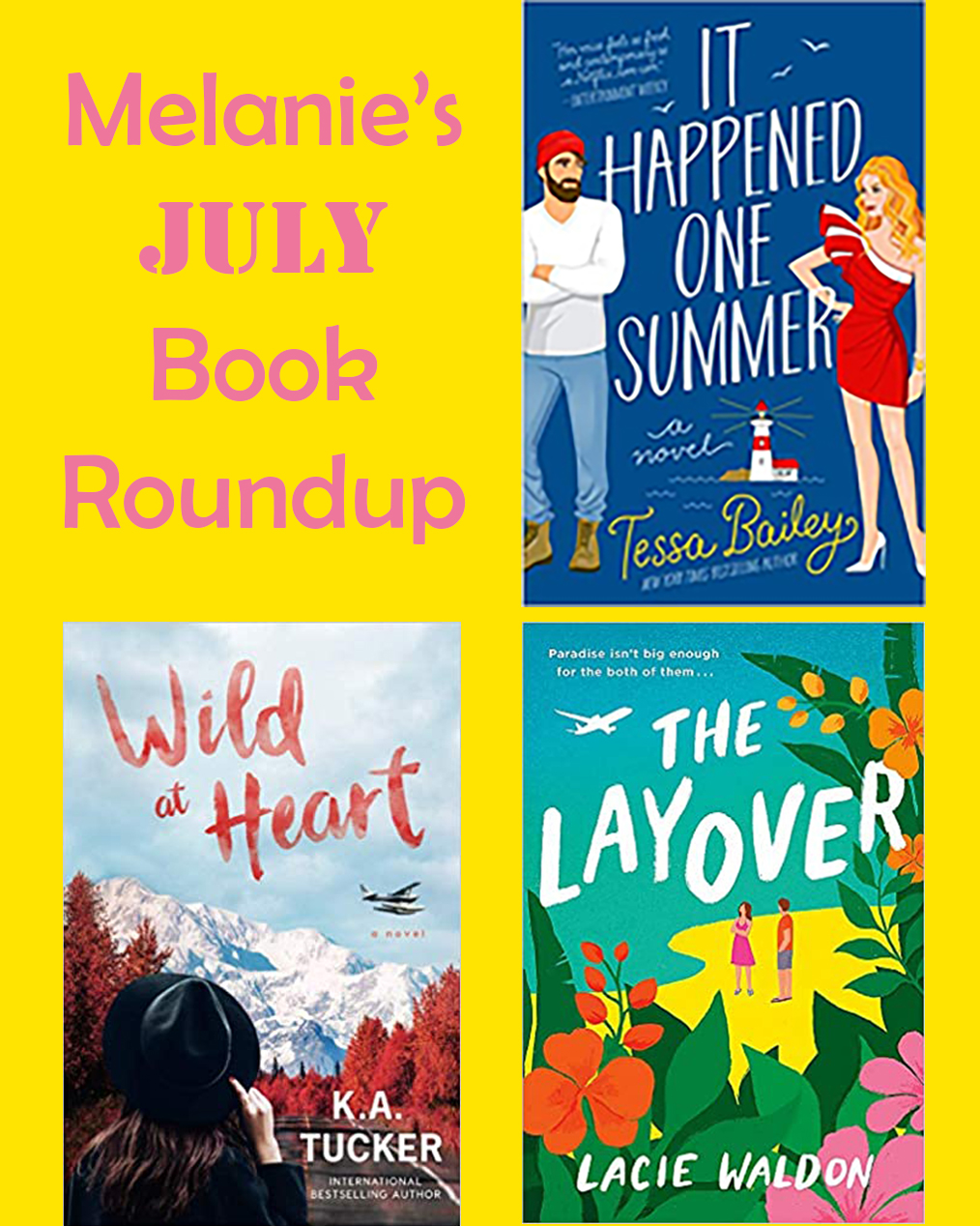
Adding to my reading list!
Hope you enjoy them!